EXECUTIVE SUMMARY
As part of its efforts to improve Pakistan-Afghanistan relations under its ongoing Track 1.5/II initiative ‘Beyond Boundaries’, CRSS invited a delegation of 10 senior Afghan businesspersons to Pakistan via Torkham. The aim of this visit was to arrange discussions of Afghan traders with senior policymakers, relevant trade officials, and media persons in Peshawar and Islamabad to highlight challenges hindering the bilateral relations and to generate recommendations for smooth resolution of the current trade issues.
The delegation including Khan Jan Alokozai, Co-President Pak-Afghan Joint Chamber of Commerce and Industry (PAJCCI); Naqibullah Safi, Executive Director PAJCCI -Kabul; Soltan Mohammad Safi, Vice Chairman ACCI; and senior businesspersons Baz Mohammad Afsarzai, Mukhlis Ahmad Younas, Ajmal Safi, Babrak Akbare, Ahmed Shah Yarzada, and Abdul Rehman Shinwari reached Pakistan through Torkham Border Crossing Point on October 05, 2021 and was warmly welcomed by the CRSS team members. The delegation participated in a Focus Group Discussion with senior government officials from FBR and customs department including custom clearing agents deployed at the Torkham border crossing point in Peshawar, engaged with media representatives in Peshawar Press Club, and interacted with the members of Pak-Afghan Friendship Group in a sideline meeting in Islamabad.
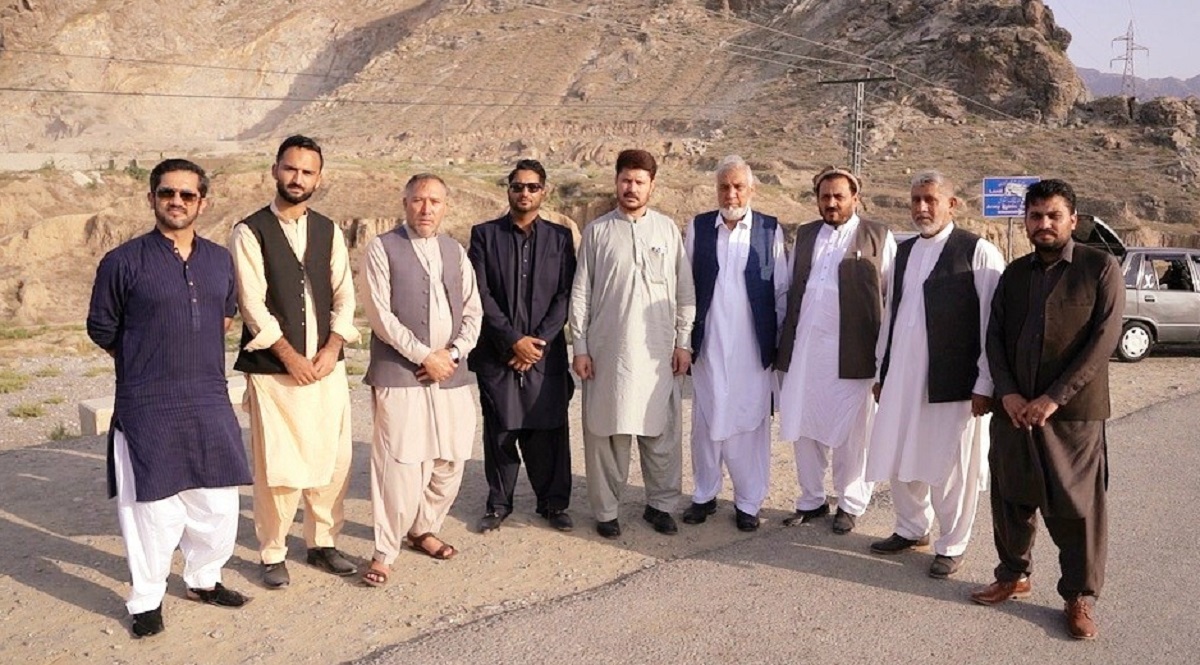
With the swift power change in Afghanistan, there came political, economic, and social disharmony and uncertainty. The sudden change of regime led to a law-and-order void in the country, with institutions being dysfunctional and the system in limbo. After the Taliban takeover, the internal and external affairs of the country transformed completely, and the challenges posed to the war-torn country multiplied. The only way forward for Afghanistan is through sustainable economic development. Currently, as the central bank reserves are frozen by the World Bank, the only way for Afghanistan’s economy to sustain itself is through trade engagements, especially with the bordering countries to reduce the cost to a minimum. Hence, Pak-Afghan trade was observed to rise in the wake of the Taliban takeover of the country. However, several challenges hindered the smooth flow of trade between the two countries.
The delegation flagged the major challenges faced by Afghan traders at the border crossing points with the Pakistani stakeholders and proposed ways to eliminate these challenges and facilitate bilateral and transit trade between Pakistan and Afghanistan. The key takeaways from the delegation’s three-day visit to Pakistan are stated below.
KEY TAKEAWAYS
- The Pakistani stakeholders assured Afghan delegates of establishing border surveillance committees at all the border crossing points to overlook the flow of trade and report the problems being faced by traders on both sides. A similar model is being followed at Afghanistan’s border with Iran.
- The relevant Pakistani officials guaranteed Afghanistan of facilitation at Torkham and of speeding up the movement of goods to and from Afghanistan to avoid spoilage of perishable goods.
- The Afghan delegation requested Pakistan to ease the visa regime along with allowing Afghans with valid Pakistani visas to travel to Afghanistan by road. Moreover, they requested Pakistan to increase the frequency of PIA flights and bring the fare back to normal.
- Afghan traders highlighted that due to delays in the State Bank of Pakistan’s issuance of Electronic Import Form (EIF), several Afghan businesses are on the verge of collapse and requested Pakistani officials to ease the process of getting an EIF.
- The Afghan delegation urged the border officials to increase the functioning hours of all border crossing points, especially Torkham and pressed for the elimination of the requirement of a gate pass.
- The Pakistani stakeholders assured the Afghan counterparts that their concerns will be tabled to the relevant departments and will be addressed by the appropriate authorities at the earliest.
FOCUS GROUP DISCUSSION
The first event attended by the Afghan traders’ delegation was a Focus Group Discussion arranged by the Center for Research and Security Studies (CRSS) at Pearl Continental Hotel, Peshawar on October 06, 2021. The Afghan delegation engaged in a detailed discussion with senior Pakistani officials from FBR, the Customs department, and border management and discussed the challenges impeding the bilateral and transit trade as well as the remedies to resolve those problems.
Highlighting the key issues faced by Afghan traders, Khan Jan Alokozai, Co-President Pak-Afghan Joint Chamber of Commerce, and Industry (PAJCCI) stated that with the increase in trade volume, the issues have also increased. The most pertinent issues include long waits at the border crossing points due to congestion leading to spoilage of perishable goods, low scanning capacity, huge unregulated taxations, and other bureaucratic hindrances. He also expressed that these problems cannot be resolved unless the situation at the border is improved.
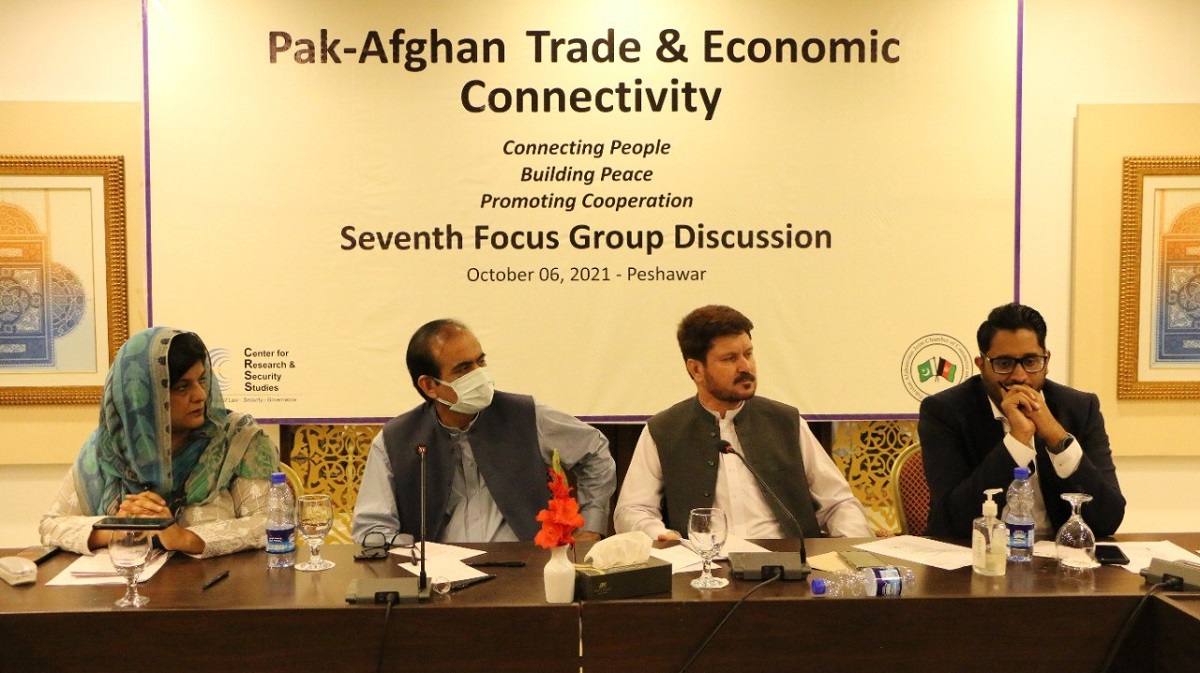
Building upon the issues highlighted by Khan Jan Alokozai, Ajmal Safi, Board Member Kunar Chamber of Commerce and Industry, recommended that the operative hours of border crossing points, especially Torkham and Ghulam Khan, must be increased along with permitting the functioning of private godowns and warehouses. Moreover, the scanning capacity at border crossings should be enhanced and the sales tax on imports from Afghanistan must be decreased to facilitate the Afghan traders. He also mentioned that a follow-up is necessary after the identification of problems.
Dr. Mukhlis Ahmad, a senior businessperson from Afghanistan briefed the participants about the significance of a custom-to-custom agreement and called for an immediate effort for the approval of such an agreement at the earliest. He also flagged that more than 1000 empty containers stuck at Torkham must be permitted to go back, so the trade flows uniformly.
The Pakistani officials heard the concerns made by the Afghan representatives and assured them of Pakistan’s support. Arbab Qaiser, Director Transit Trade, welcomed the Afghan delegation and apprised them that the sales tax on fresh fruits imported from Afghanistan has been waived off, and the Torkham border crossing point is kept open 24/7 on special instructions of chairman FBR. He also briefed the participants that more than ninety percent of work has been done for the renegotiation of APTTA 2010, and it will be renegotiated soon. He also stressed the necessity of a Preferential Trade Agreement between Afghanistan and Pakistan.
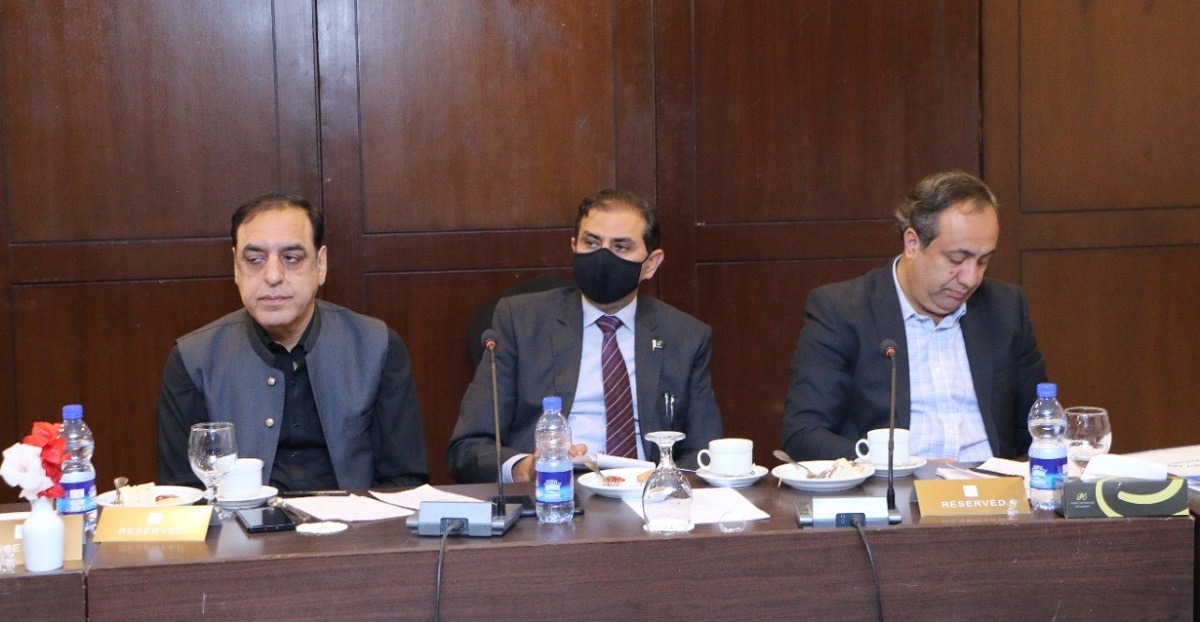
Adding to the points, Javed Khattak, CEO Khyber Pakhtunkhwa Economic Zones Development and Management Company (KPEZDMC) suggested that a bilateral committee should be formed by the collective efforts of both governments to find joint solutions to problems and issues posed to bilateral and transit trade. Addressing the concern of congestion at border crossing points, he stated that placing the scanners few kilometers away from the zero points can effectively help in reducing the choking of border crossing points. He also apprised traders from both sides about the latest containers with an in-built facility of cold storage. He suggested that such containers should be used to avoid the spoilage of perishable goods in case of any delays.
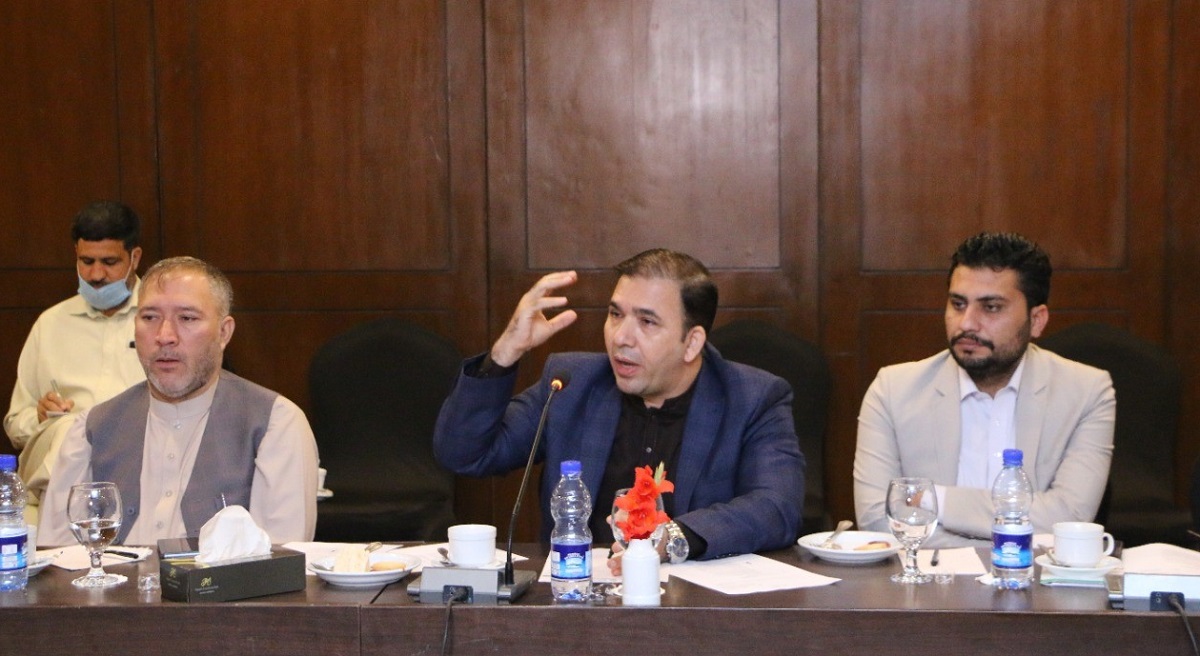
The discussion was concluded on the point that such interactions of traders and relevant officials from both sides must be held in both Afghanistan and Pakistan to pave way for smooth bilateral business activities.
MEDIA ENGAGEMENT
The delegation also visited the Peshawar press club later in the day, where they engaged with national and international media. This engagement aimed to highlight concerns vis-à-vis bilateral and transit trade mechanisms through this forum. Furthermore, the print media representatives also held a Q&A session with the traders regarding recent political developments in Afghanistan. Speaking to the media, Mr. Khan Jan Alokozai thanked the media representatives for joining the session and continuously raising matters regarding cross-border movement post-Taliban takeover. He acknowledged the role of media in harmonizing and strengthening the bilateral trade relations and urged them to carry on their impressive and expressive work until the issues are resolved.
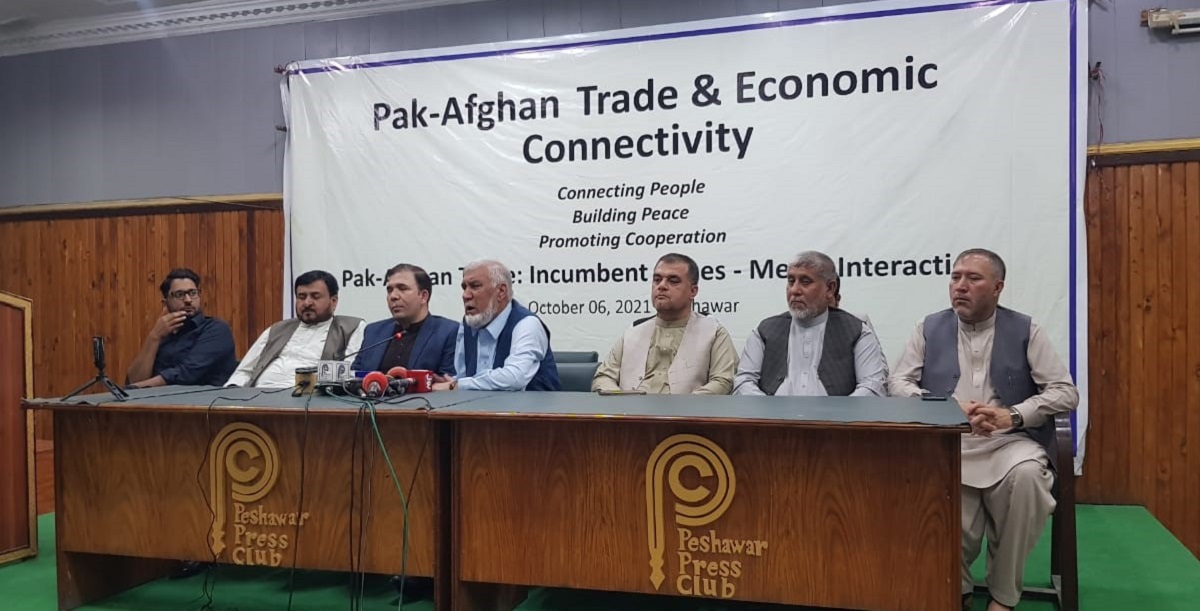
Mr. Alokozai stated that since the Taliban takeover, the trade between both countries has smoothened a lot as the Taliban has successfully eliminated corruption and illegal taxes which were being collected in the past regime. Furthermore, Co-Chairman PAJCCI also briefed regarding the improved security situation in Afghanistan which has allowed the traders to carry out their businesses in a relaxed environment. He also requested the Pakistani government to facilitate timely transportation of the perishable goods as unnecessary delays result in huge financial and goods losses. He said that this issue will also be raised with the policymakers in Islamabad.
Mr. Ajmal Safi stated that the banking system has been adversely affected post August 15, 2021, due to international sanctions on the new regime which has also dented the bilateral trade between Afghanistan and Pakistan. He stated that several Afghan traders have relocated to other countries due to these sanctions and challenges. He urged the international community to facilitate the Afghan people and introduce business-friendly policies for the people of Afghanistan.
In the end, the traders also requested the Pakistani government to resolve bureaucratical impediments which are hindering the bilateral trade relations. They also demanded the government to facilitate the opening of more trade routes to improve trade volume between the two countries. They also urged the government to provide trade licenses to the Afghan businesspersons which will allow them to trade freely with Pakistan.
STRATEGIC SIDELINE MEETING WITH PAK-AFGHAN FRIENDHSIP GROUP MEMBERS
Lastly, the delegation of Afghan traders met the members of the Pak-Afghan Friendship Group (PAFG) in a strategic sideline meeting organized by CRSS, on October 07, 2021, at Serena Hotel, Islamabad.
Highlighting the issues hindering bilateral trade between the two countries, Mr. Khan Jan Alokozai stated that currently, when all the international funds allocated to Afghanistan are frozen, Pakistan should help the neighbor by continuing to engage in trade with it, especially by continuing to import goods from Afghanistan. He also briefed the Pakistani stakeholders about the bureaucratic hindrances which lead not only to congestion at the Torkham border crossing point but also hinder the bilateral and transit trade. He also asked for relaxation in the visa regime, especially for patients and traders.
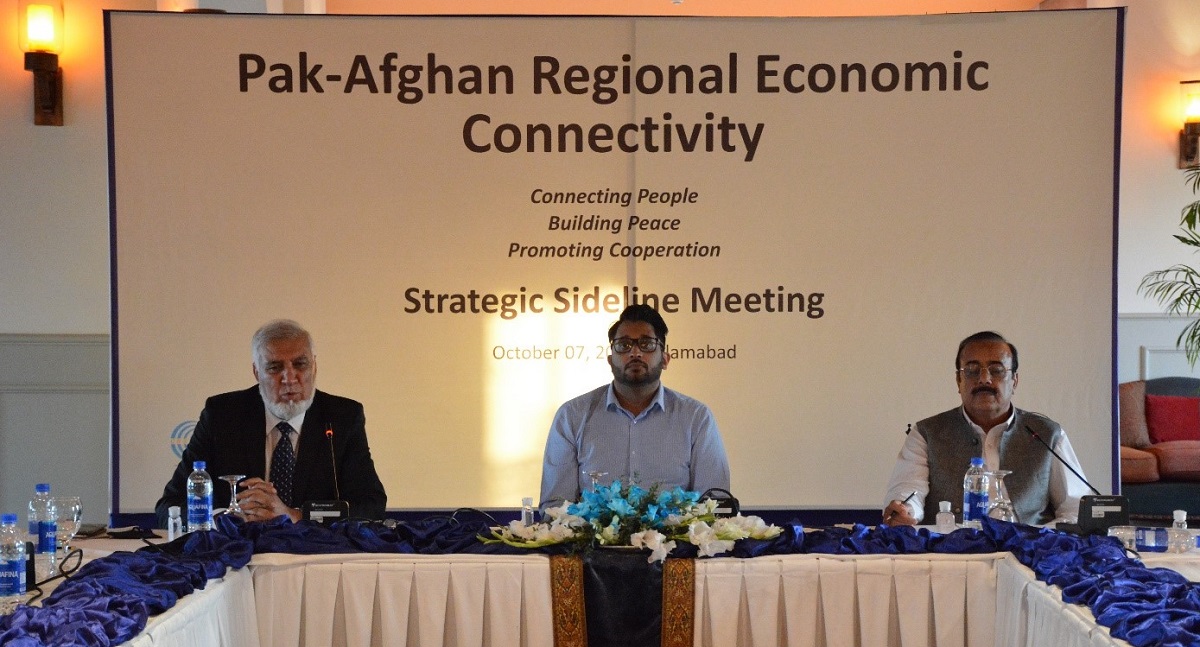
Mr. Yaqoob Sheikh, Member National Assembly of Pakistan and PAFG, commended CRSS’ efforts to take the initiative to facilitate economic connectivity between the two countries and stated that both the countries should work to resolve the problems faced by people on borders. He further added that Pakistan is working to eliminate the problems faced by Afghan traders and is trying to ease the process of doing business.
Expressing concern over the problems faced by Afghan traders, he ensured them that Pakistan will stand with its Afghan brothers through this hard time. He added that traders are neutral entities and can play a significant role in promoting regional economic connectivity.
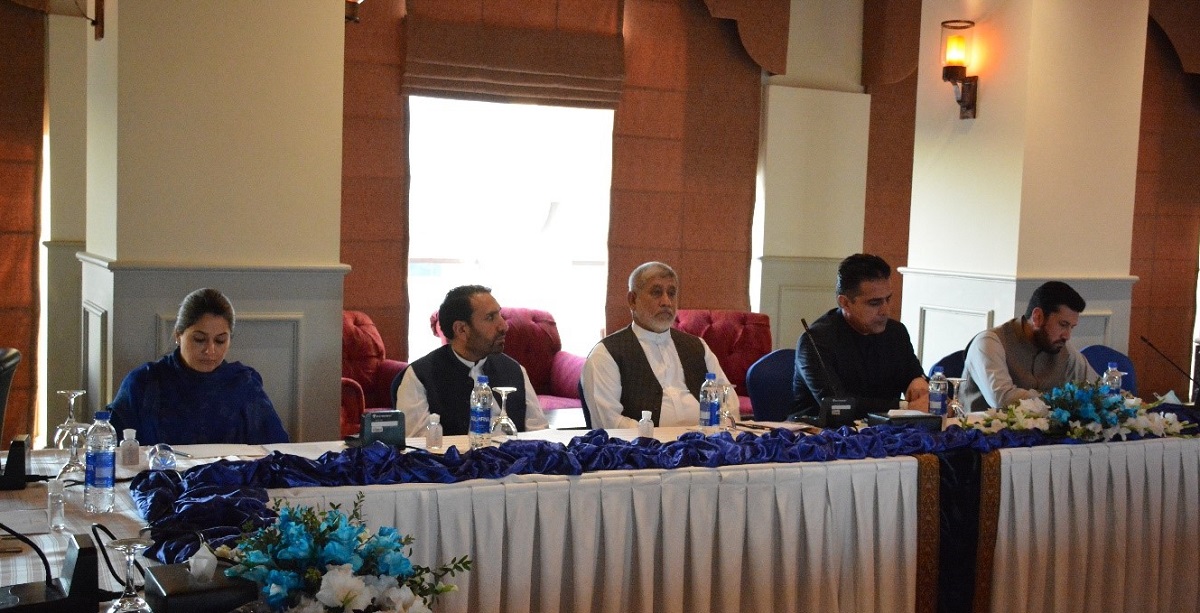
Adding to the conversation, Mr. Ajmal Safi, Board Member Kunar Chamber of Commerce, and Industry, added that since Pakistani banks are actively rejecting the Electronic Import Form (EIF) which will eventually minimize imports from Afghanistan to zero. Elucidating the participants about the reason behind the congestion at border crossing points, he stated that the major reason behind the congestion is National Logistics Cell’s (NLC) low scanning capacity. He suggested that NLC should enhance its scanning capability and increase its staff.
Vice President Chamber of Investment and Industry, Mr. Sultan Muhammad Safi thanked CRSS and the members of PAFG for their efforts to enhance trade interaction between the two countries and suggested that to improve the flow of trade, the number of border staff and scanners should be increased. Moreover, the problems hindering the renegotiation of APTTA 2010 need to be resolved on an immediate basis. Restating Afghanistan’s need for Pakistan’s support and cooperation in these testing times, he requested Pakistan to stand with its brotherly neighbor.
Thanking CRSS for inviting the delegation from Afghanistan at such a crucial time, MNA Shandana Gulzar stated that the Pakistan government under the leadership of PM Imran Khan wants to have strong relations with Afghanistan, especially in the trade sector. She assured the Afghan delegates that their concerns will be tabled to the Speaker National Assembly, the chair of Pak-Afghan Friendship Group (PAFG) and will be addressed by the relevant authorities at the earliest.
To conclude, the group agreed on the point that at this stage, Pakistan should formulate and implement business-friendly policies, along with renegotiating APPTA 2010, on an immediate basis while taking into consideration the role of the private sector, as enhancing trade is a way to help Afghanistan in these testing times. Improving the flow of trade and promoting economic connectivity is the only way for both countries to prosper.
